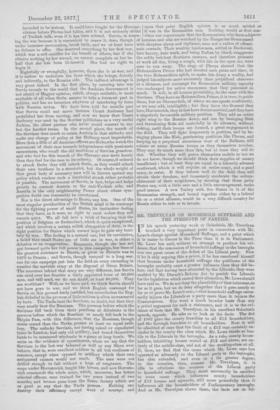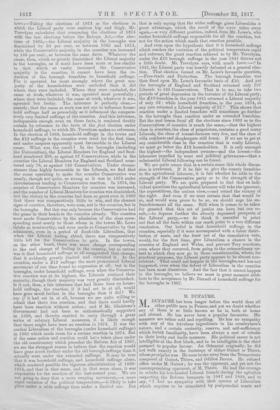MR. TREVELYAN ON HOUSEHOLD SUFFRAGE AND THE STRENGTH OF PARTIES.
IN his speech yesterday week at Galashiels, Mr. Trevelyan I touched a very important point in connection with Mr. Lowe's charge against Household Suffrage, and a point whieli it is easier to discuss in the Press than it is in Parliament. Mr. Lowe has said, without an attempt to produce his evi- dence, that the concession of household suffrage to the boroughs was one great cause of the defeat of the Liberal party. Now if he is only arguing this a priori, if he has convinced himself that because under household suffrage the publicans of the boroughs probably exert a greater influence than they did be- fore, and that having been alienated by the Liberals,,they were enabled by Mr. Disraeli's Reform Act to punish the Liberals for the legislation which caused their alienation, Mr. Lowe should have said so. We do not deny the plausibility of that inference, so far as it goes, but we do deny altogether that it goes nearly so far as to prove Mr. Lowe's case,—that household suffrage neces- sarily injures the Liberals as a party more than it injures the Conservatives. You want a much broader basis than any a priori argument for such a statement, and it is to the evi- dence of facts that Mr. Trevelyan, in his excellent Galashiels speech, appeals. He asks us to look at the facts. The Act of 1867 gave the county franchise to all £12 householders, and the borough franchise to all householders. Now it will be admitted at once that the limit of a £12 rent certainly ex- cludes in the county the class which Mr. Lowe thinks so hos- tile to the Liberals in the boroughs. As a rule, county house- holders, inhabiting houses rented at £12 and above, are en- tirely of the middle-class, and not of the working-class at all. If, then, we find that the cause which Mr. Lowe says has operated BO adversely to the Liberal party in the boroughs, has also extended, and even in a far greater degree, to the counties, then, reasons Mr. Trevelyan, it is idle to attribute the reverses of the Liberal party to household suffrage. They must necessarily be ascribed to some cause which influences county householders of £12 houses and upwards, still more powerfully than it influences all the householders of Parliamentary +boroughs. And as Mr. Trevelyan shows them, the facts are as fel-. lows ;—Taking the elections of 1874 as the elections in which the Liberal party were smitten hip and thigh, Mr. Trevelyan calculates that comparing the elections of 1874 with the last elections before the Refoi:m Act,—the elec- tions of 1865,—the Liberal majority in the boroughs was diminished by 34 per cent, as between 1865 and 1874, while the Conservative majority in the counties was increased by 168 per cent., as between the same dates. Whatever the cause, then, which so greatly diminished the Liberal majority in the boroughs, as it must have been more or less similar to that which so vastly increased the Conservative majority in the counties, it cannot have been the re- duction of the borough franchise to household suffrage. For it operated far more strongly where the great ma- jority of the householders were excluded than it did where they were included. Where they were excluded, the cause at work, whatever it was, operated most powerfully ; where they were included, the cause at work, whatever it was, operated but feebly. The inference is perfectly clear,— namely, that the cause at work was not one to influence house- hold suffrage half as poweifully as it influenced the compara- tively very limited suffrage of the counties. And this inference, indisputable enough even on these facts, is rendered doubly certain by reference to the facts of the fivst election under household suffrage, to which Mr. Trevelyan makes no reference. In the election of 1868, household suffrage in the towns and the i12 suffrage in the counties were tried for the first time, and under auspices apparently most favourable to the Liberal cause. What was the result ? In the boroughs (including the Universities), the Liberal Members for England and Scot- land numbered 236, as against 97 Conservatives, while in the .counties the Liberal Members for England and Scotland num- . bored only 78, as against 140 Conservatives. Under circum- stances thus highly favourable to the Liberals, we find that the cause operating to make the counties Conservative was nearly, though not quite, as strong as it was in 1874 under circumstances tending to Conservative reaction. In 1874, the - number of Conservative Members for counties was increased, and the number of Liberal Members for counties was diminished, • IAA the victory in the counties had been so great even in 1869 that there was comparatively little to win, and the clearest signs of reaction, therefore, were seen, not in the counties, but in the boroughs. But this was only because the Conservatives had the game in their hands in the counties already. The counties were made Conservative by the admission of the class corre- sponding most nearly to those whom in the towns Mr. Lowe thinks so trustworthy, and were made so Conservative by that admission, even in a period of flood-tide Liberalism, that when the Liberal feeling ebbed, there was comparatively little left for the Conservatives to gain. In the towns, on the other hand, there was more change corresponding -to the real change of feeling in the country, but so untrue was it that household suffrage at all exaggerated that change, that it evidently greatly limited and restricted it. In the counties, under a £12 suffrage the most pronounced Liberal movement of our time found no expression at all but in the boroughs, under household suffrage, even when theConserva- tine reaction was at its highest, the Liberals retained. their • majority, though their majority was very greatly diminished. . Is it not, then, a fair inference that had there been no house- hold suffrage, the reaction, if it had set in at all, would • have gone much farther in the boroughs than it did? We say if it had set in at all, because we are quite willing to • admit that there was reaction, and that there could hardly have been reaction without action ; and if Mr. Gladstone's • Government had not been so enthusiastically supported in 1868, and thereby enabled to carry through a great seriee of salutary Liberal measures, it is likely enough that there might have been no reaction in 1874. It was the cordial Liberalism of the boroughs (under household suffrage) in 1869 which made room for a certain reaction in 1874. But if the same action and reaction could have taken place under .:the old constituency which preceded the Reform Act of 1867, we see the strongest reason to believe that the reaction would have gone much further under the old borough suffrage than it actually went under the extended suffrage. It may be true that it was household suffrage, and household suffrage alone, which rendered possible the vigorous administration of 1869- 1874, and that in that sense, and in that sense alone, it was responsible for the reaction of the last-named year. We are not going to deny that a more swaying movement,—a more rapid variation of the political temperature,-.-is likely to take place under a wide suffrage than under a limited one. But that is only saying that the wider suffrage gives Liberalism a great advantage, which the recoil of the wave takes away again,—a very different position, indeed, from Mr. Lowe's, who makes household suffrage responsible for all the reaction, but not for the action which made that reaction possible.
And even upon the hypothesis that it is household suffrage which renders the variation of the political temperature rapid and extreme, the great reaction referred to by Mr. Trevelyan, under the £10 borough suffrage in the year 1841 throws not a little doubt. Mr. Trevelyan says, with much force :—" In 1841, the Liberal party was heavily defeated at a general elec- tion. That election turned on Mr. Lowe's favourite question, —Free-trade and Protection. The borough franchise was then fixed upon Mr. Lowe's favourite basis of £10. And yet the boroughs of England and Scotland returned only 197 Liberals to 165 Conservatives. That is to say, to take two periods of great depression in the fortunes of the Liberal party, the £10 franchise in the year 1841 returned a Liberal majority of only 32; while household franchise, in the year 1874, at any rate returned a Liberal majority of 37." This shows that reaction under a limited franchise will sometimes go further in the boroughs than reaction under an extended franchise. But the real lesson from: all the elections since 1832 as to the Conservatism of counties is much the same,—that the highest class in counties, the class of proprietors, contains a good many Liberals the class of tenant-farmers very few, and the class of villa residents and shopkeepers still fewer. If we are to get at any considerable class in the counties that is really Liberal, we must go below the £12 householders. It is only amongst the highest—the independent owners—and the lowest—the labourers impelled by want and political grievances—that a substantial Liberal following can be found. We are quite aware that in a certain sense this whole discus- sion is irrelevant. If it be fair to give the county franchise to the agricultural labourer, it is fair whether he adds to the strength of the Conservative party or to the strength of the Liberal party. We are quite prepared to find that on indi- vidual questions the agricultural labourer will take the ignorant, the superstitious, the untrue view,—and retard the victory of the right. And even if we were certain that that would be so, and would soon prove to be so, we should urge his en- franchisement all the same. Still when it comes to be taken for granted that this act of justice can have but one re- sult,—to depress further the already depressed prospects of the Liberal party,—we do think it essential to point out that all the facts within our reach point to a very different conclusion. Our belief is that household suffrage in the counties, especially if it were accompanied with a fairer distri- bution of seats, and the freer use of the cumulative vote, would, for the first time, give Liberalism a chance in the counties of England and Wales, and prevent Tory reactions, even where they occurred, from going to the extraordinary ex- tent to which they now go in those constituencies, where, for practical purposes, the Liberal party appears to be almost non- existent. That could not happen in the borouglis,-and has not happened, even when the defeat of Liberalism in the counties has been most disastrous. And the fact that it cannot happen in the boroughs, we believe we must in great measure attri- bute to the acceptance by Mr. Disraeli of household suffrage for the boroughs in 1867.







































 Previous page
Previous page